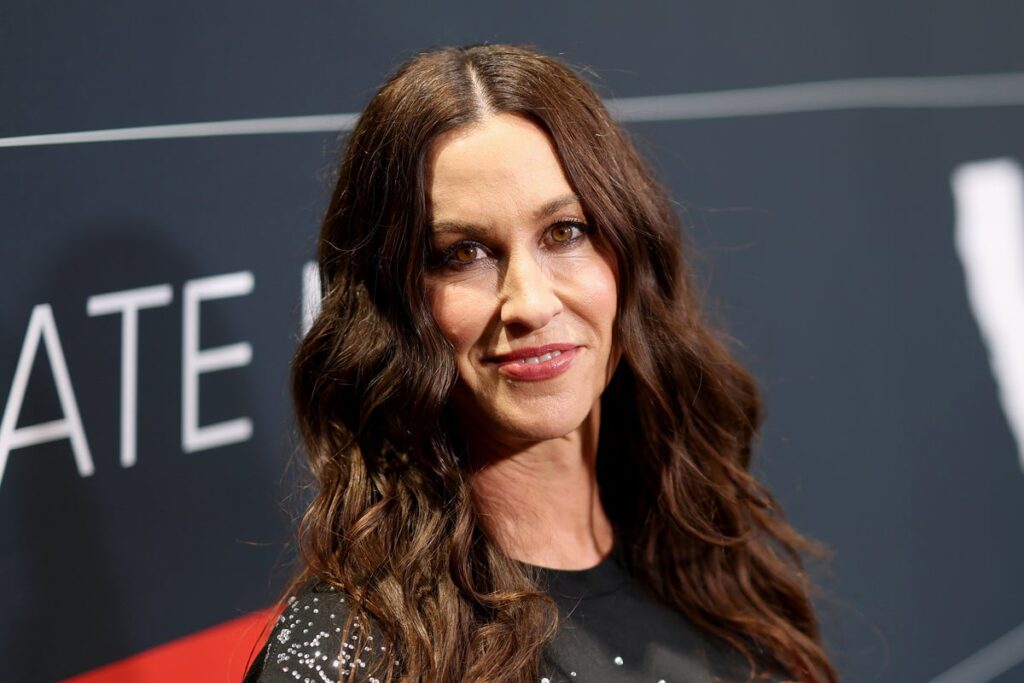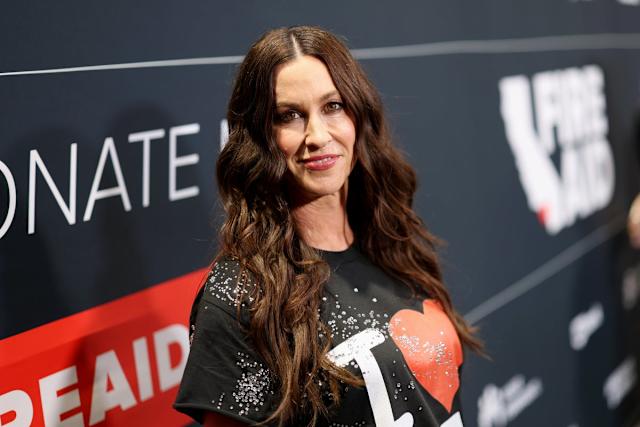Alanis Morissette has never been one to mince words. From the moment her breakthrough album Jagged Little Pill exploded in 1995, she’s been the voice of a generation — fierce, vulnerable, brutally honest. Now at 51, the singer-songwriter is once again speaking with unflinching clarity. In a new interview with The Guardian, published on June 21, Morissette opens up about the dark undercurrents of her early fame, the performative masks she wore to survive, and the exhausting resurgence of toxic beauty standards.
With her trademark emotional candor, Morissette reflects on how the music industry — and society at large — shaped and misshaped her journey. What emerges is not only a personal story of endurance and self-discovery, but also a broader cultural critique. It’s about women who were told to be louder, sexier, thinner, and more compliant — and what it means to finally reject that narrative.
Alanis Morissette’s rise to fame was meteoric. When Jagged Little Pill hit the airwaves, her raw lyrics and jagged vocals caught the world by storm. Songs like “You Oughta Know” and “Ironic” gave voice to emotional pain with a searing honesty that resonated across gender and geography.
But behind that voice was a young woman struggling to navigate an industry with little regard for her well-being.
“There was no one to hide behind,” she told The Guardian. “What I found in terms of the lovely patriarchy, was that at that time if men couldn’t (have sex with) me, they didn’t know what to do with me.”
It’s a chilling, yet all-too-familiar story for women in entertainment — objectified, dismissed, or exploited based on their willingness to fit a narrow mold. For Morissette, being young, talented, and uninterested in catering to male desires left her vulnerable and often unsupported.
She recounts how she often felt isolated in an industry that valued volume over introspection. “I was like, ‘OK, I’m going to pretend to be an extrovert for the next 25 years,’” she admitted. To cope, she turned to substances like tequila and Xanax, anything that would help her perform a version of herself that fit the expectations.
“Tequila – anything that allowed me to be the life of the party – or if I was doing a talk, Xanax. Anything that would help me pretend I’m not me.”
It’s a painful paradox: to succeed, she had to silence the very parts of herself that made her music so powerful.
For Morissette, the pretense came at a steep emotional cost. While audiences saw an empowered rocker with chart-topping singles, she was quietly battling addiction, eating disorders, and the gnawing sense that she was living a life that wasn’t truly hers.
Her coping mechanisms weren’t born of weakness but of necessity. They were shields in an industry that had little room for sensitivity or stillness — and even less for women who resisted being objectified.
“I spent 25 years trying to be someone who didn’t have this temperament,” she said. “At 51, I feel this is just what it is like.”
That self-acceptance didn’t come easily, but it’s hard-earned. Today, Morissette is finally at peace with her introversion, her temperament, and her refusal to contort herself for public approval.
“Now there’s zero desire to present as something that I’m not,” she said.
It’s a powerful declaration from someone whose entire career was once shaped by external expectation. Her words offer a sense of liberation — not just for herself, but for anyone who has felt the pressure to pretend.
While Morissette has found a new comfort in her own skin, she’s not oblivious to the disturbing resurgence of harmful beauty ideals. One trend in particular feels like déjà vu: the return of the “size zero” aesthetic — thinness, hypersexuality, and unattainable perfection.
“We thought that whole era was done, right? We sorted this out! Didn’t we?” she asked, exasperated. “Oh, we didn’t. We dropped the ball… the hyper-sexualization thing is so boring.”

Morissette’s frustration is palpable — and warranted. In recent years, the fashion and entertainment industries have seen a worrying backslide into the very trends feminists spent decades pushing back against. From the return of ultra-thin runway models to the glamorization of surgically-enhanced bodies on social media, the “ideal woman” is once again being reduced to a narrow, harmful stereotype.
What makes it even more insidious is how it’s often masked as empowerment. Women are told they’re choosing to dress provocatively or manipulate their bodies — when in reality, they’re still playing by old rules written by patriarchal norms.
Morissette’s words cut through the noise. She isn’t condemning sexiness or self-expression — she’s rejecting the expectation that women must be sexually appealing to be seen, heard, or valued.
Alanis Morissette’s candidness also holds a mirror up to the entertainment industry, which continues to exploit and discard artists — especially women — in the name of profit.
She’s not the only one speaking out. In recent years, fellow artists like Britney Spears, Kesha, and Taylor Swift have also pulled back the curtain on the toxic dynamics that govern fame. But Morissette’s story adds a crucial layer: it shows how these dynamics have endured across decades, shapeshifting but never disappearing.
Her 90s fame wasn’t just about talent. It was also about surviving in an environment that didn’t know what to do with her — unless it could mold her into something else.
That mold, she now knows, never fit.
For fans who’ve followed Morissette’s journey, her latest revelations feel like a natural evolution. Her music has always been a study in vulnerability — confessions turned into choruses, insecurities transformed into anthems.
But now, the vulnerability comes with a sense of calm.
Morissette isn’t raging against the machine. She’s stepping outside of it, choosing peace over performance.
This version of Alanis — the one who’s comfortable with her temperament, who doesn’t need to feign extroversion, who sees the world’s toxic beauty standards and calls them out — is perhaps her most powerful yet.
She’s no longer seeking validation. She’s telling the truth, on her terms.
What makes Morissette’s perspective so compelling is that she’s not just revisiting her past — she’s contextualizing it. Her story isn’t simply about one woman’s struggles in a male-dominated industry; it’s about the systems that continue to shape women’s lives.
She highlights how trends are cyclical, how the pressures of conformity often repackage themselves for new generations, and how internalized those expectations can become. But she also shows that healing and self-acceptance are possible.
Her legacy now extends beyond music. It’s in the stories she tells, the interviews she gives, and the space she creates for others to be honest about their pain.
In a world obsessed with image, youth, and perfection, Morissette’s voice remains a radical act. Not just in her songs, but in her refusal to conform, her openness about mental health and addiction, and her critique of the industry that made her famous.

She’s a reminder that authenticity isn’t about baring your soul once and moving on — it’s a lifelong practice. It’s about learning who you are beneath the noise, the expectations, and the roles you’ve been assigned.
At 51, Alanis Morissette is done pretending. She’s embracing her truth — not just as a performer, but as a person.
And in doing so, she’s helping others do the same.
Alanis Morissette’s recent reflections aren’t just a look back — they’re a call to action. To rethink the standards we hold women to. To resist the return of toxic beauty ideals. To create spaces where artists, especially women, can be fully themselves without fear or shame.
In her own words, she spent 25 years pretending. But now, there’s “zero desire to present as something that I’m not.”
That kind of clarity doesn’t just come with age — it comes with courage. And it’s exactly why her voice still matters, perhaps more than ever.
As the industry cycles through new stars and new scandals, Alanis Morissette remains a steadfast truth-teller. And in a world desperate for something real, that truth is revolutionary.



